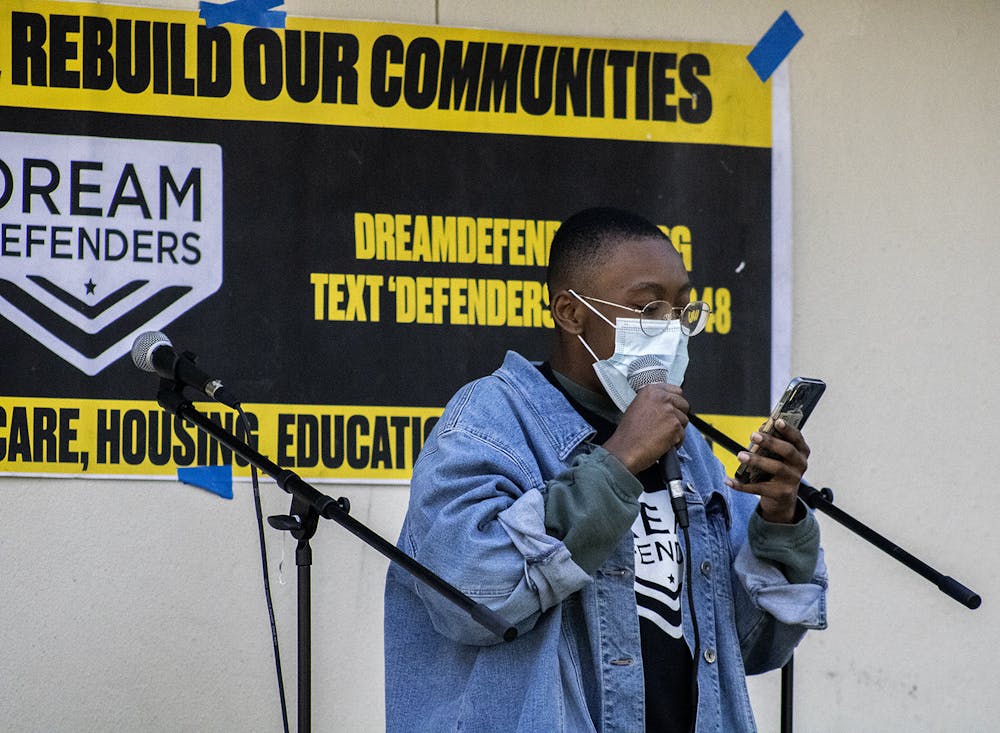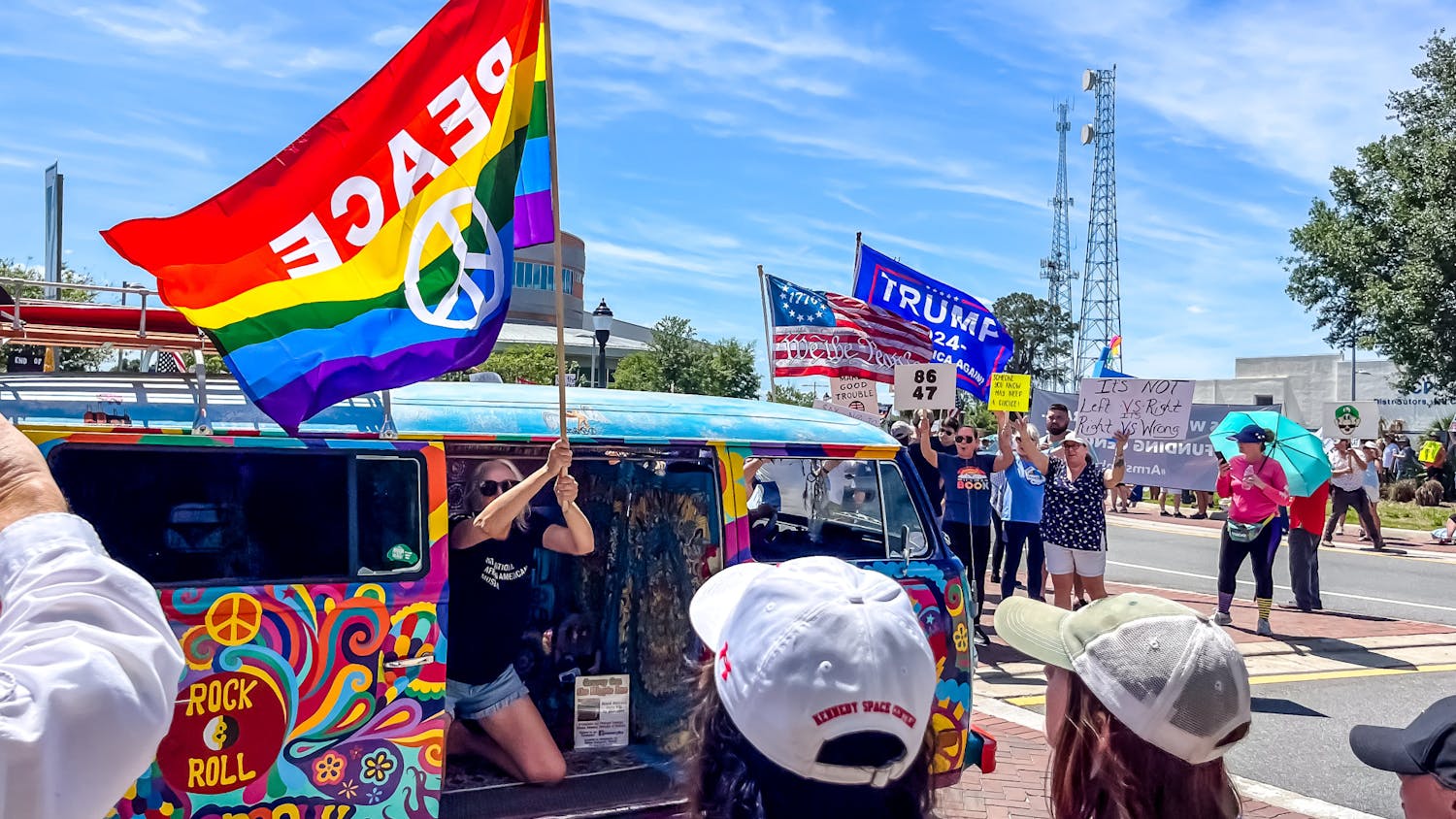Gainesville’s City Commission approved a motion that will allow two nonprofits and the city attorney to draft a formal complaint against Florida’s House Bill 1. The complaint could lead to a lawsuit that would challenge the bill in court.
Gov. Ron DeSantis signed the bill into law on April 19. It aims to more severely punish people who commit crimes during a riot and limit local governments from defunding police departments.
The governor introduced the bill in September as a response to the Black Lives Matter protests last summer. Opponents of the bill argue it strips power away from local governments and gives too much power to the governor’s office.
Gainesville Mayor Lauren Poe criticized the bill during a city commission meeting May 20.
“I feel intimidated and threatened through this bill, and I feel like I’m being told I cannot make the government’s decisions,” he said.
Commissioner David Arreola offered similar criticism during the meeting.
“The idea about this law is that the governor has the power to deputize local law enforcement and to have more power than any of the cities in their given state and any law enforcement chief and any law enforcement officer,” Arreola said. “That’s the kind of power that gets used in governments around the world that are not known for good things.”
A team of lawyers at Community Justice Project, Public Rights Project and the City of Gainesville would work together to bring forth the lawsuit against the state if Gainesville commissioners and the city attorney approve it.
Public Rights Project is a nonprofit organization focused on helping local and state governments protect the legal rights of residents. Community Justice Project is a team of lawyers focused on serving community organizers in low-income and minority communities.
Both organizations are willing to work on the lawsuit at no cost to Gainesville taxpayers, and both approached the city with a proposal to sue the state.
“Gainesville is really well-poised to lead here and I think it would be meaningful for other cities to join if Gainesville is leading,” LiJia Gong, a counsel at Public Rights Project, said.
The first step toward this goal was taken May 20 when city commissioners approved a motion to draft a formal complaint against the state. The team of lawyers has to draft the complaint within 30 days to present to Gainesville’s city commission. If the complaint is approved by city commissioners in a month, the lawsuit would likely move forward.
Gainesville’s city attorney Nicolle Shalley said she does not recommend the city move forward with a lawsuit at this time. She prefers to wait for the HB 1 law to go into effect and violate a law in order to give them firmer legal grounds to sue the state. Her office will still work with both nonprofits to draft a complaint nonetheless.
Although he opposes the bill, Commissioner Harvey Ward said he’s skeptical of suing the state without the city attorney’s approval.
“I’m not sure how we move forward without more clear support from our own attorney staff,” Ward said.
Some Gainesville residents called into the commission meeting to express support for the challenge, while others disagreed with the challenge.
“It’s amazing that this commission spends so much time discussing frivolous lawsuits and national issues instead of their own utility problems,” Nathan Skop, a Gainesville resident, said during public comment.
Veronica Robleto, an immigrant rights paralegal at Florida Legal Services, voiced support for the lawsuit during public comment.
“The city attorney, in my view, has always erred on the side of not taking a stand,” she said. “But we have multiple legal organizations presenting and telling you that there is a basis, so I would encourage you to listen to other legal voices beyond simply the city attorney.”
Representatives of both the Community Justice Project and Public Rights Project cited concerns with the state’s power to interfere with police reform under the law.
The law is a clear response to last summer’s calls for racial justice, Berbeth Foster, a senior staff attorney at Community Justice Project, said. Community organizers know the law is a direct attempt to stop efforts to reimagine public safety.
Jonathan Miller, the Public Rights Project legal director, said the project’s team is concerned about the potential for states across the country to pass sweeping laws like HB 1 that would interfere with community preferences having to do with civil, worker or immigration rights.
Georgia’s governor Brian Kemp signed House Bill 286 May 7, which prohibits local counties from decreasing local police budgets. The law will go into effect July 1.
Florida’s HB 1 similarly limits local governments from changing any police department budget unless it increases, Commissioner Arreola said.
“Gainesville is ready to challenge this law,” Arreola said. “It’s sad to look at a law like this and think this is where our state has gone.”
Contact Alex Lugo at alugo@alligator.org. Follow him on Twitter @alexlugo67.

Alex is a fourth-year journalism student at UF and is in his third semester at The Alligator where he is serving as the university editor. He previously reported on university administration and the city and county commission. In his free time, he enjoys video games, traveling and being outdoors.






